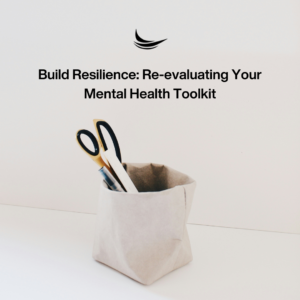Build Resilience: Re-evaluating Your Mental Health Toolkit
 Even the best tools get dull with repeated use and require maintenance to be the most effective. Now that school is over, it is the perfect time to look at what is in your mental health toolkit.
Even the best tools get dull with repeated use and require maintenance to be the most effective. Now that school is over, it is the perfect time to look at what is in your mental health toolkit.
Many professions depend on the individual to be physically and emotionally strong to ensure a positive impact on those they influence. This is especially true for those in a caretaking role since they help support the needs of others.
Teachers are professionals who actively use themselves within the work. Educators devote time and energy to students as they learn, grow, and develop skills as learners.
When teachers do not have adequate time and space to care for themselves, the result directly impacts physical and emotional well-being. The signs can be subtle, although noticeable.
Even the most positive and energetic people I know experience moments of fatigue. When mental health is not addressed early on, the results can contribute to an unsatisfying quality of life and poor coping skills.
Teachers are life-long learners who tend to have a well-stocked toolbox of skills for their students. When it comes to having a personal set of tools for building strength and resilience, how does this look in comparison? Teachers may become so focused on providing tools to others, not even noticing how sparse their toolbox has become. It is important to assess what tools are in your toolbox and evaluate their effectiveness.
For optimal well-being, I will share five steps teachers can take as they do an inventory of their resources. While a set of essentials is a must-have, having effective and strong tools will be the key to building resiliency among teachers.
Identify essential tools for overall wellness.
Our minds and bodies require a strong foundation of essentials to be effective. This includes physical and emotional safety, meeting basic needs, adequate sleep, healthy foods, physical activity, and supportive relationships within various environments. The Substance Abuse and Mental Health Services Administration (SAMHSA) has an awesome visual that includes eight dimensions of wellness: emotional, spiritual, intellectual, physical, environmental, financial, occupational, and social. What is your reaction as you read each area? Do you see any potential action steps?
Look out for signs of wear.
Most people will focus on various dimensions at different times, depending on their priorities. Awareness is the first step to identifying areas of strength and areas that may need more attention. Certain areas may be neglected, while other areas may be a significant source of stress, or perhaps trauma.
Replace tools that are no longer effective.
While you may repair tools that are starting to show wear, you may also choose to replace certain tools that are no longer effective. Choosing between repair or replacement is hard, especially when you have a strong physical or emotional attachment.
Re-stock tools that are missing.
Loaning out resources without replenishing them can drain the reserves and leave you feeling depleted. Taking inventory of your tools will help you identify items that need replacing and ensure that you have a strong set of hard-working essentials (reserved just for you), in addition to a few fun extras.
Sharpen and care for your tools.
This is essentially taking care of yourself and surrounding yourself with others who help you become the best version of yourself. This may look like sticking to the commitments you made for yourself, such as keeping routines and setting boundaries.
I recommend having a trusted person you can confide in related to your mental health weekly, in addition to having at least three coping skills that are effective that you regularly implement. Finally, know that talking to a mental health professional does not mean that you are not already strong or resilient. A therapist can help strengthen the tools that you have as a means of building resilience, ensuring that you are fully equipped.
Written By: Charlotte Johnson, MA, LPCC



























